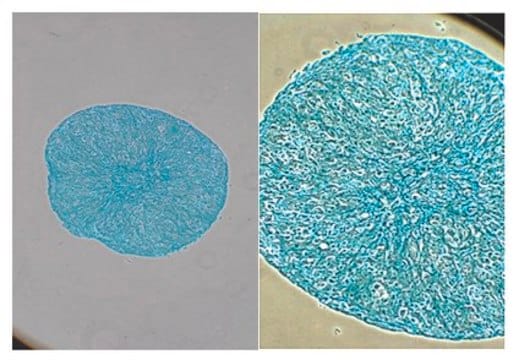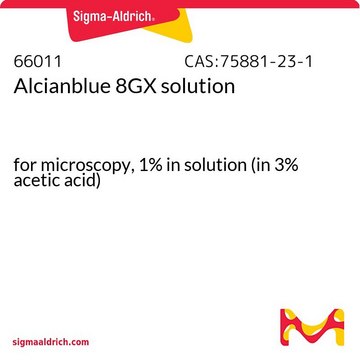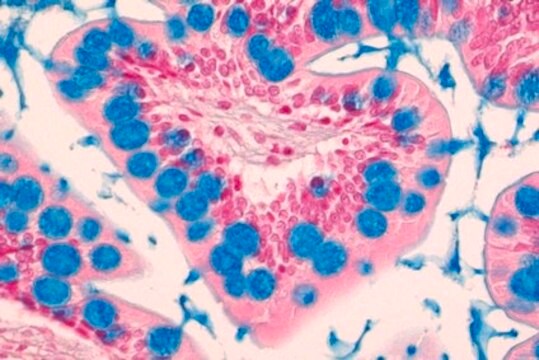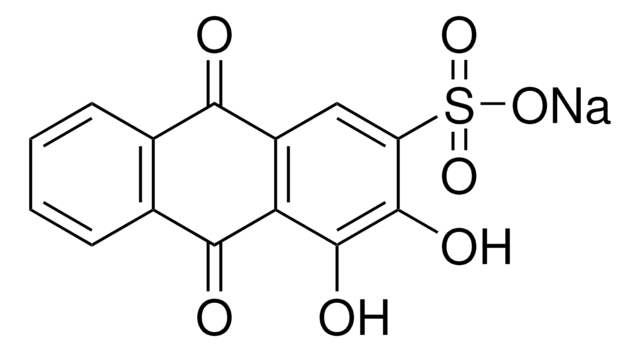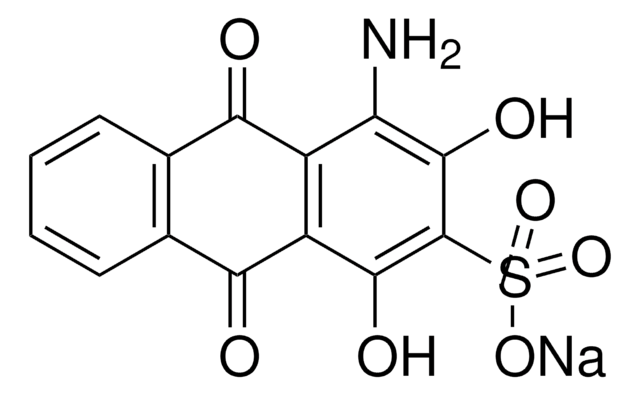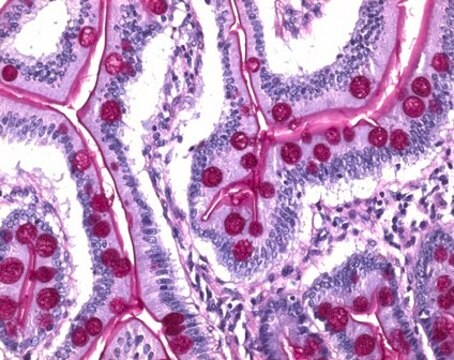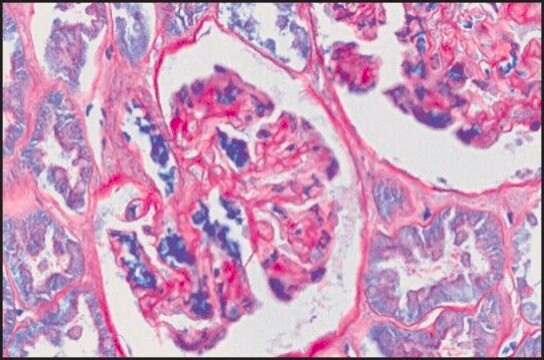B8438
Alcian Blue solution
1% in 3% acetic acid, pH 2.5
Sinonimo/i:
Alcian Blue 8XG solution
Autenticatiper visualizzare i prezzi riservati alla tua organizzazione & contrattuali
About This Item
Codice UNSPSC:
12171500
NACRES:
NA.47
Prodotti consigliati
Forma fisica
liquid
Livello qualitativo
Concentrazione
1% in 3% acetic acid, pH 2.5
Colore
dark blue to very dark blue
Intervallo di pH
2.4-2.6
Amax
0.45-0.60 (1:400 in H2O)
applicazioni
diagnostic assay manufacturing
hematology
histology
Temperatura di conservazione
room temp
Applicazioni
Alcian Blue solution has been used in the histological staining of acidic glycosaminoglycans (GAGs; mucopolysaccharides) that are carboxylated or sulfated. Sulfated glycosaminoglycans appear to be the preferred substrate for alcian blue at pH 2.5. Alcian blue has been used to stain hyaluronan (HA), a nonsulfated GAG, but the intensity of the staining of HA is affected by the method of tissue fixation used. Alcian blue staining of GAGs in tissue may be modified through the addition of an electrolyte such as magnesium chloride.
Azioni biochim/fisiol
Alcian Blue is a cationic dye. It forms insoluble complexes with acidic glycosaminoglycans, thereby aiding in the quantitative determination of glycosaminoglycans. It is also used for the staining of bone and cartilage.
Codice della classe di stoccaggio
12 - Non Combustible Liquids
Classe di pericolosità dell'acqua (WGK)
WGK 2
Punto d’infiammabilità (°F)
Not applicable
Punto d’infiammabilità (°C)
Not applicable
Certificati d'analisi (COA)
Cerca il Certificati d'analisi (COA) digitando il numero di lotto/batch corrispondente. I numeri di lotto o di batch sono stampati sull'etichetta dei prodotti dopo la parola ‘Lotto’ o ‘Batch’.
Possiedi già questo prodotto?
I documenti relativi ai prodotti acquistati recentemente sono disponibili nell’Archivio dei documenti.
I clienti hanno visto anche
A procedure for differential staining of cartilage and bone in whole formalin-fixed vertebrates.
Wassersug R J.
Stain Technology, 51(2), 131-134 (1976)
W Lin et al.
The journal of histochemistry and cytochemistry : official journal of the Histochemistry Society, 45(8), 1157-1163 (1997-08-01)
The apparent intensity of hyaluronan (HA) staining in tissue sections can vary as a function of fixation techniques. We examined the histochemical distribution of HA in normal human skin using an HA-specific binding peptide derived from bovine nasal cartilage. The
The quantitative determination of glycosaminoglycans in urine with Alcian Blue 8GX.
Whiteman P.
The Biochemical Journal, 131(2), 351-357 (1973)
Mario Barilani et al.
Cell transplantation, 25(8), 1501-1514 (2016-02-07)
During the last decade it has been demonstrated that mesenchymal progenitors are present and can be isolated also from cord blood (CB). Recently, we managed to set up a standard protocol allowing the isolation of mesenchymal stromal cells (MSCs) with
Hao Wu et al.
Experimental cell research, 361(2), 324-332 (2017-11-04)
Mesenchymal stem-cell based therapies have been proposed as novel treatments for intervertebral disc (IVD) degeneration. The development of these treatment strategies, however, has been hindered by the incomplete understanding of the origin, biological properties of nucleus pulposus (NP) derived stem/progenitor
Il team dei nostri ricercatori vanta grande esperienza in tutte le aree della ricerca quali Life Science, scienza dei materiali, sintesi chimica, cromatografia, discipline analitiche, ecc..
Contatta l'Assistenza Tecnica.
